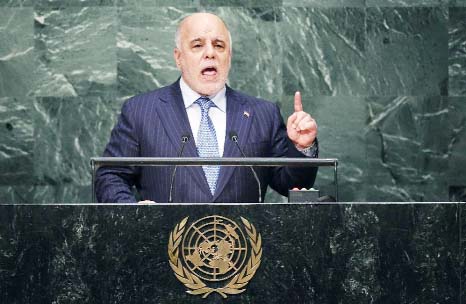
AFP, Baghdad :Prime Minister Haider al-Abadi said Iraq does not need foreign ground troops to defeat the Islamic State group, after Washington announced it would deploy special forces to fight the jihadists.Abadi did not directly reject the deployment, of which US Secretary of State John Kerry said Baghdad had been informed before the announcement, but he insisted that any operations be coordinated with the Iraqi government.The presence of American ground forces is a contentious issue in Iraq, where the United States fought a nearly nine-year war, and it is politically expedient for Abadi to distance himself from the deployment.”There is no need for foreign ground combat forces in Iraqi territory,” Abadi said in a statement released late Tuesday in which he praised the performance of Iraqi special forces.”The Iraqi government stresses that any military operation or presence of any foreign force, special or not, in any place in Iraq cannot be done without its approval and coordination with it,” the statement said. Defence Secretary Ashton Carter said Tuesday that the US was deploying a “specialised expeditionary targeting force” to Iraq to work alongside local forces against IS, which overran large parts of the country last year.On Wednesday, Kerry said in Brussels that “the government of Iraq was of course briefed in advance of Secretary Carter’s announcement”.”We will continue to work very, very closely with our Iraqi partners on exactly who would be deployed, where they would be deployed, what kinds of missions people would undertake, how they would support Iraqi efforts to degrade and destroy” IS, Kerry said. “I can assure you that as the plans are developed, it will be in full consultation and with the full consent of the Iraqi government,” he said.US-led coalition spokesman Colonel Steve Warren said Wednesday the new special forces deployment would number roughly 100 personnel, and that it had been discussed with Abadi.”We’ve been talkin’ about this with the prime minister for weeks,” Warren said.Meanwhile, slowly but surely, Barack Obama is edging the United States deeper into a war against the Islamic State group that looks set to dominate the last year of his presidency.After a year of air strikes that have stifled but not stopped ISIS jihadists, Obama’s administration this week announced a series of measures that signal the fight will be central to his remaining time in office.After repeatedly ruling out the use of “boots on the ground,” Obama agreed to send as many as 200 special forces to Iraq, with a mandate to carry out raids inside Syria.Less noticed was the appointment of trusted national security aide Rob Malley to coordinate the administration’s policy against the Islamic State group, which is also known as ISIL or ISIS.Malley has advised Obama since his 2008 presidential election campaign, and played a pivotal role in shepherding the nuclear deal with Iran — Obama’s top foreign policy priority.Malley’s appointment is part bureaucratic housekeeping — an effort to tie together disparate diplomatic, military, intelligence, humanitarian and financial efforts.But it is also a signal that the Islamic State group will now take up as much political bandwidth as previous priorities like the Iran deal.

